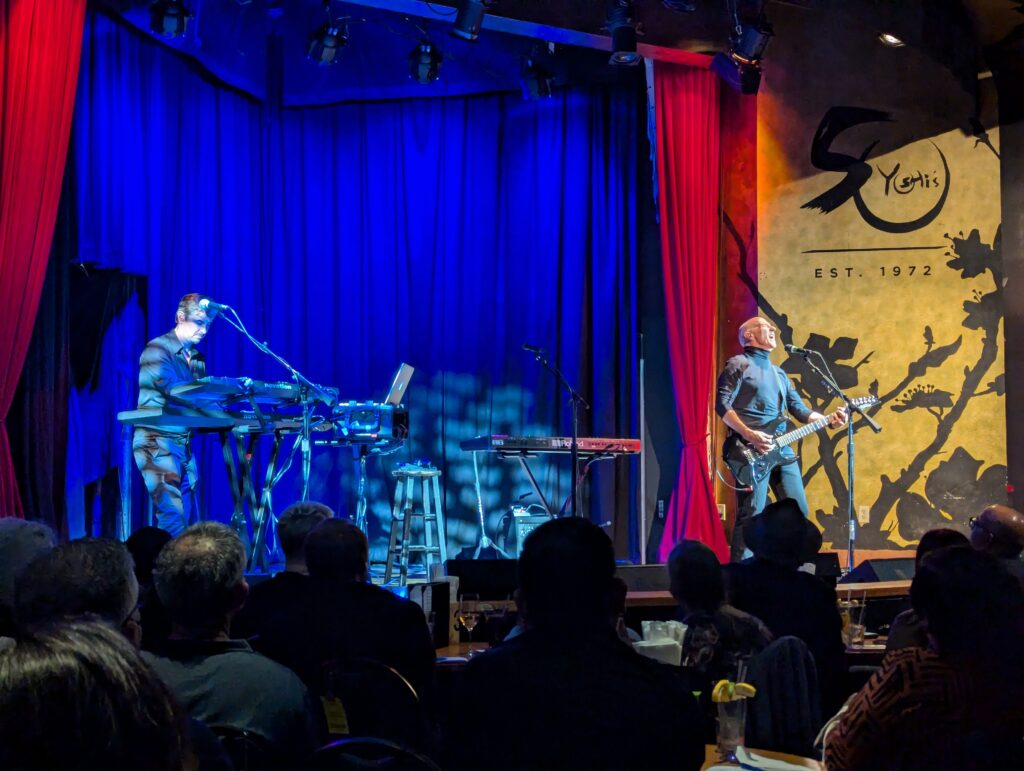Midge Ure
Yoshi’s, Oakland
August 29, 2024
Photos by Tyler King
What do the bands Ultravox, Visage, Thin Lizzy, and Rich Kids have in common? They all featured the talents of singer and musician Midge Ure, who announced his first headlining tour since 2021 would be bringing him to Yoshi’s in Oakland. I had seen him once before a couple of years ago opening for Howard Jones, and, being an especially big fan of his solo career as well as his work with Ultravox, jumped at the chance to see Midge performing a headlining set.
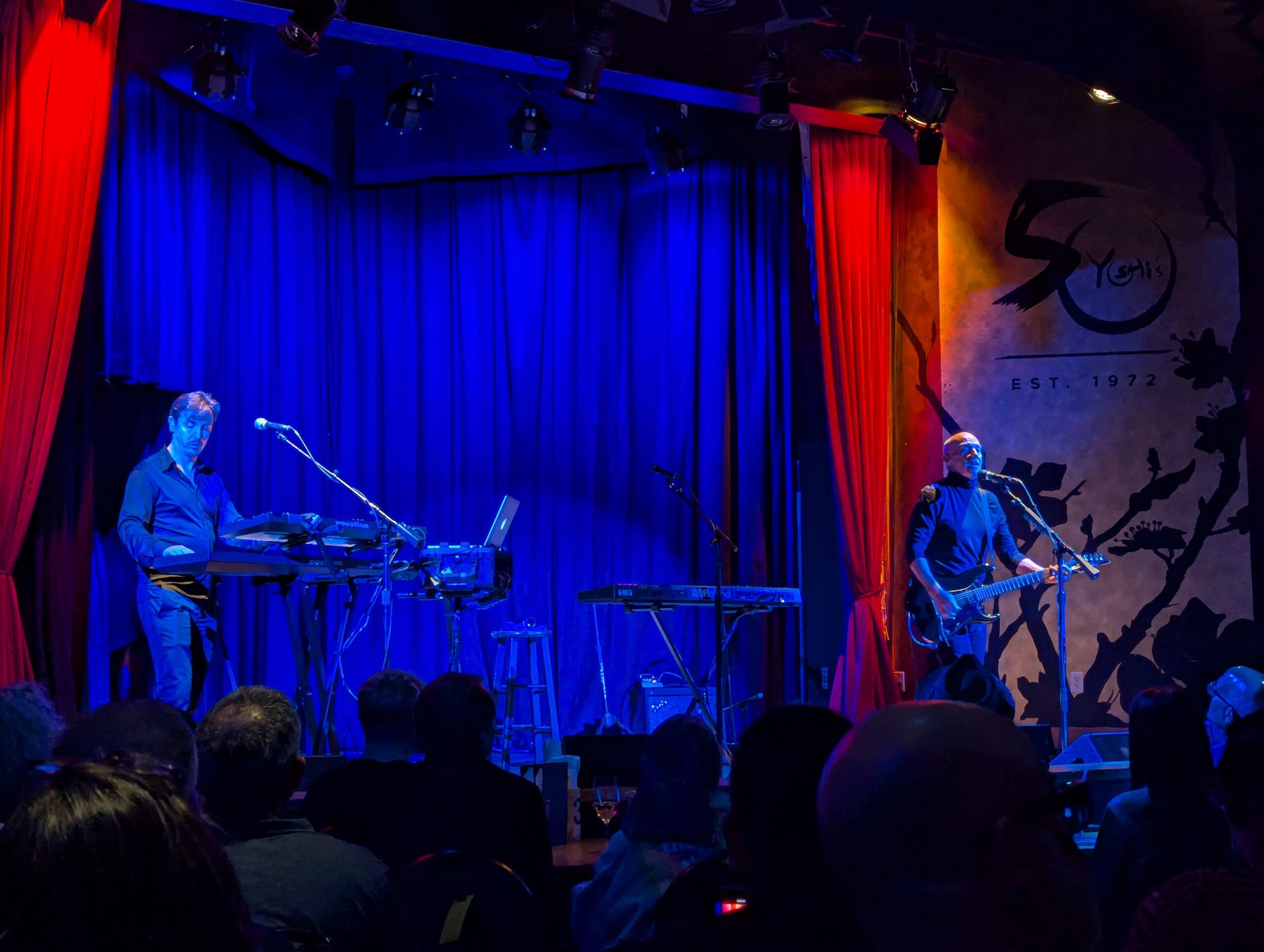
Walking onstage with no fanfare, Midge opened his set with an extended version of “Dear God,” a single from his second solo album Answers To Nothing. He told the audience afterwards that he was going to play some songs that he hadn’t in quite some time, and it would be up to the audience to decide if there’s a reason for that. One of the songs in question was the next one, “I Remember (Death In The Afternoon),” a song from Ultravox’s 1981 album Rage In Eden. One of a few album tracks that Midge played throughout the night, the song still had the desired effect of having the entire audience singing along to it, the song proving to be a fan favorite.
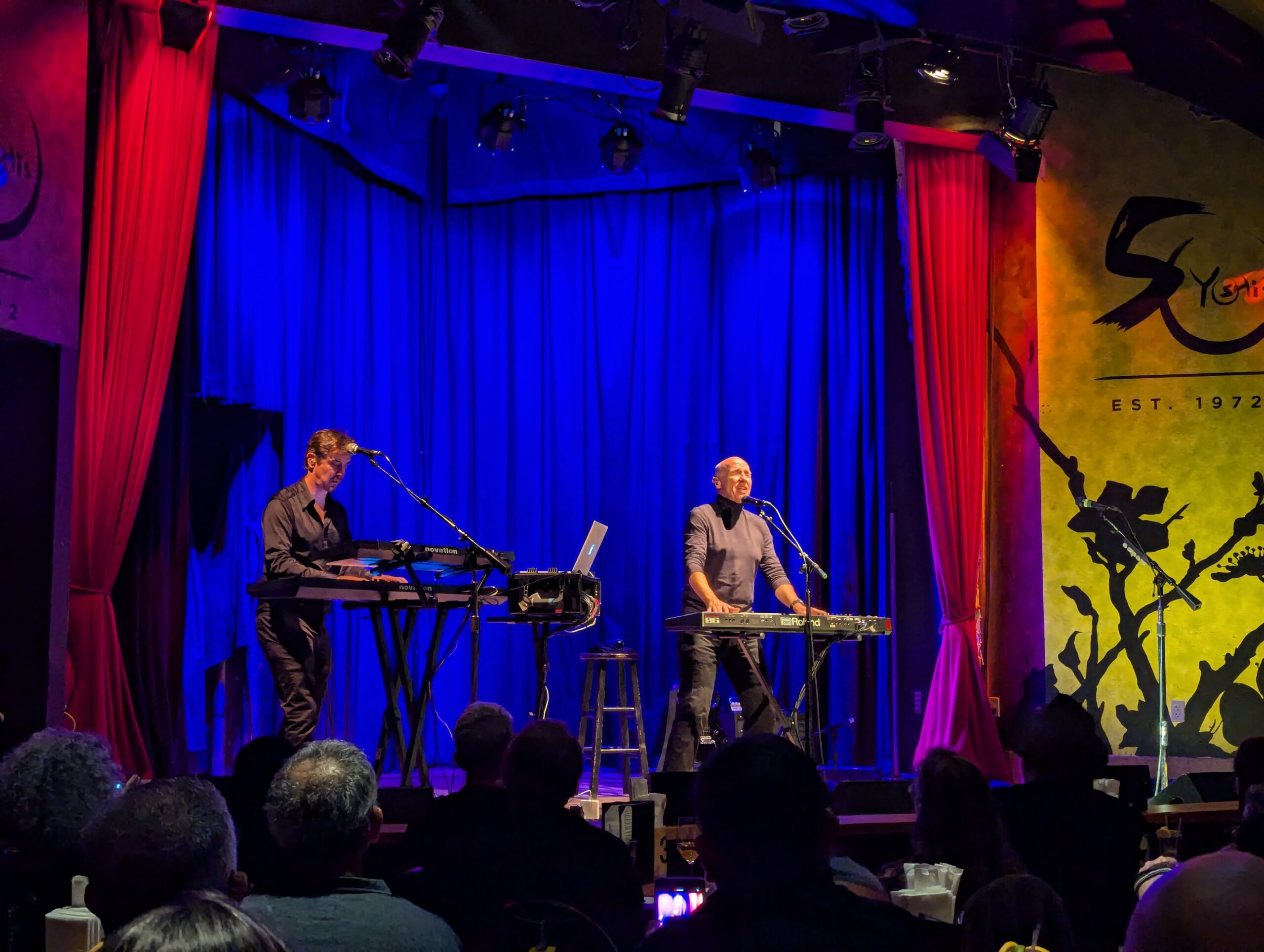
Employing the “band in a box” technique that he used on his last tour supporting Howard Jones, this tour sees Midge joined onstage only by his keyboardist Charlie Round-Turner. Very few musicians can make such a live set-up seem legitimate, what with a laptop running the majority of the backing tracks while only the vocals and a couple of instruments are played live. Midge Ure completely squashed that notion though, his performance having a legitimacy and vitality to it that few other artists with a similar setup are able to capture.
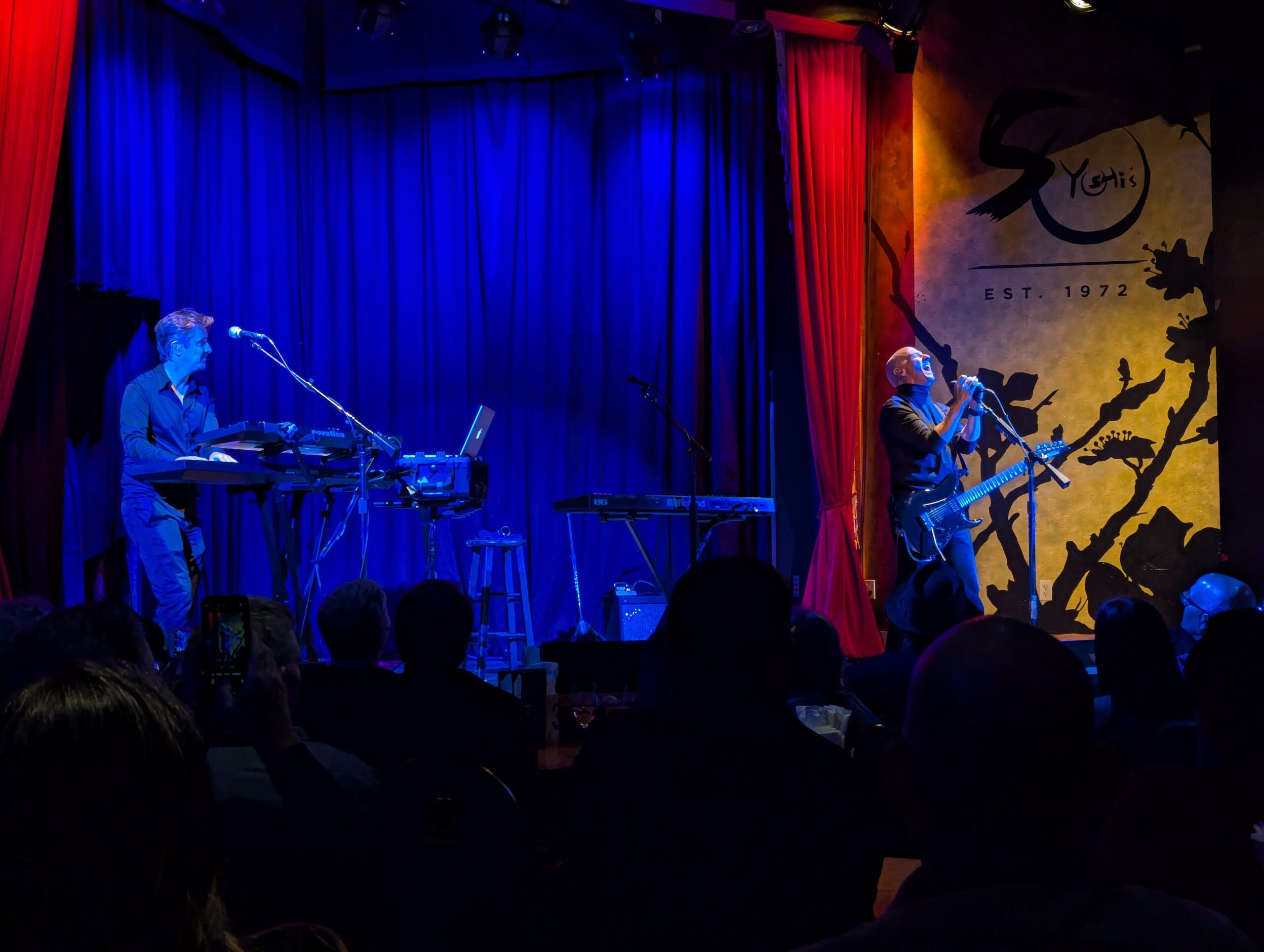
At one point during the set, a woman seated near me turned to look at me and said, “It’s amazing how many iconic songs he’s had a hand in.” And it’s true. He was able to go from “Fade To Grey” by Visage to his cover of David Bowie’s “The Man Who Sold The World” to Ultravox’s “Sleepwalk” with ease, each song showing off his skills not just as a singer but also as a composer and arranger, with his version of “The Man Who Sold The World” probably being my single favorite reinterpretation of the classic Bowie song (sorry, Nirvana). It was the only song of the evening that he didn’t have a hand in the writing of, with most of the songs in the setlist being from his days as the frontman of Ultravox.
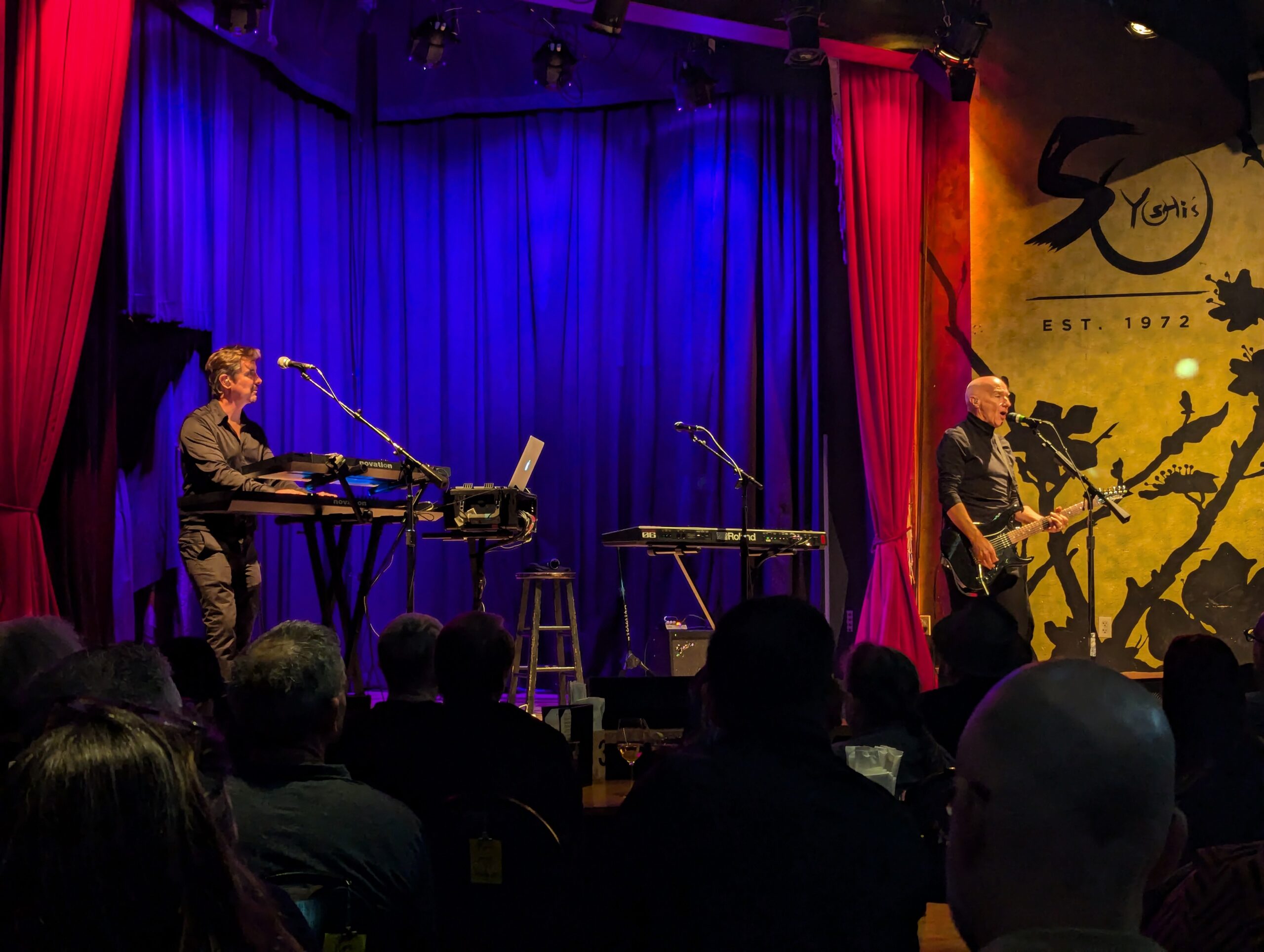
Arguably the most powerful stretch of songs in the evening was the three-song run that started with “Dancing With Tears In My Eyes,” a song that saw a crowd form near the side of the stage to scream every song of the heartbreaking chorus back at Midge. It was followed by Ultravox’s biggest hit, 1980’s “Vienna,” a song which saw everyone in the crowd crying, “This means nothing to me! Oh, Vienna!” as the song reached its emotional chorus. The third song in the stretch was another Ultravox single, “The Voice,” a song whose title makes me immediately think about the shape and the power of Ure’s own voice, a voice which, at the age of 70, is still able to both command and soothe the audience when needed.
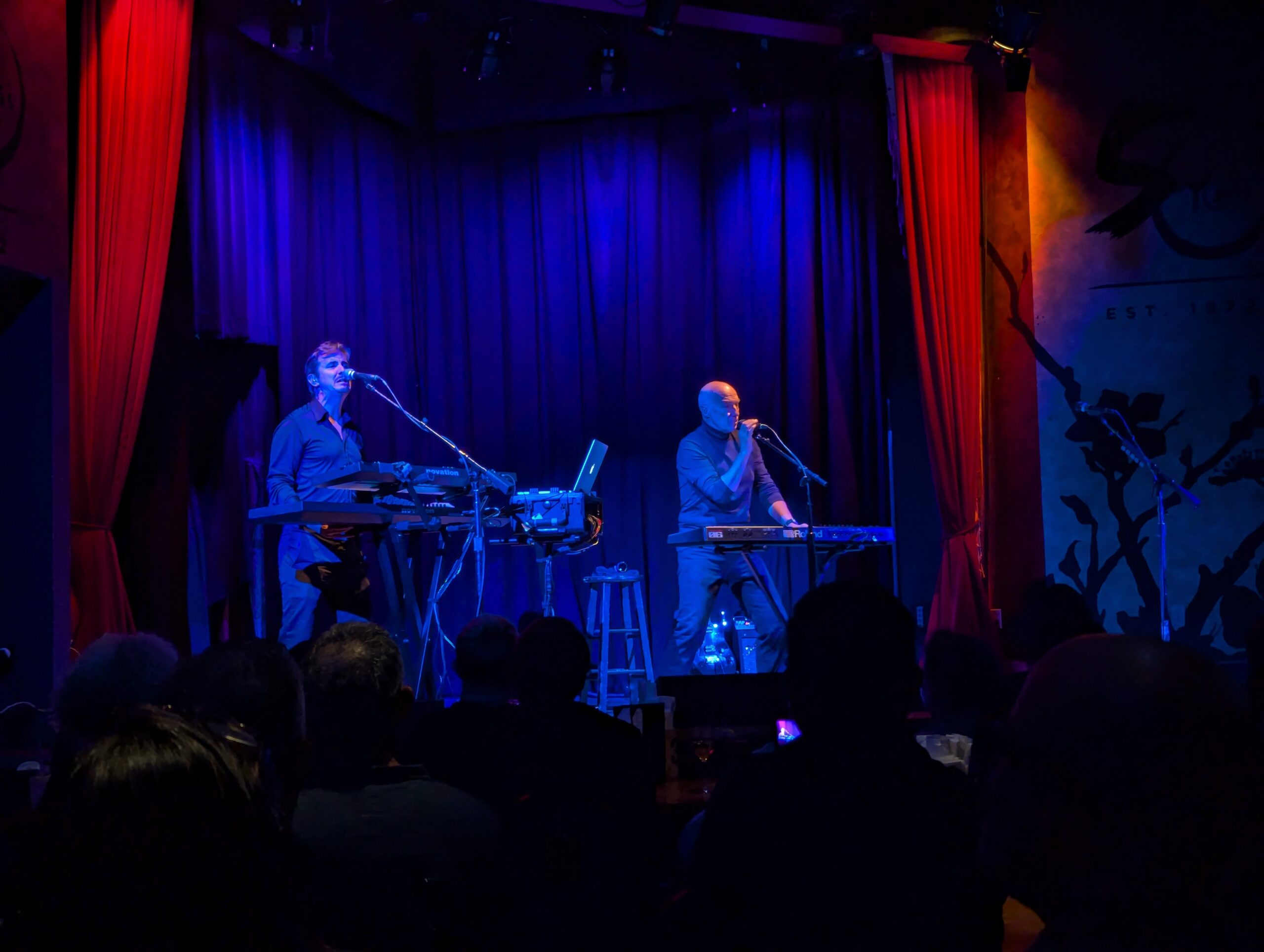
The show came to an end with another song from Midge’s solo career, “If I Was,” the lead single from his debut album The Gift. If I have one complaint about the selection of the setlist for the evening’s show, it’s that I wish that he had included more songs from his solo career, as songs like “If I Was” and “Dear God” were just as powerful as anything else that he played throughout the evening. The monumental chorus came to a close, Midge told the audience that he would see us all soon, and then he and Charlie exited the stage to a roaring standing ovation.
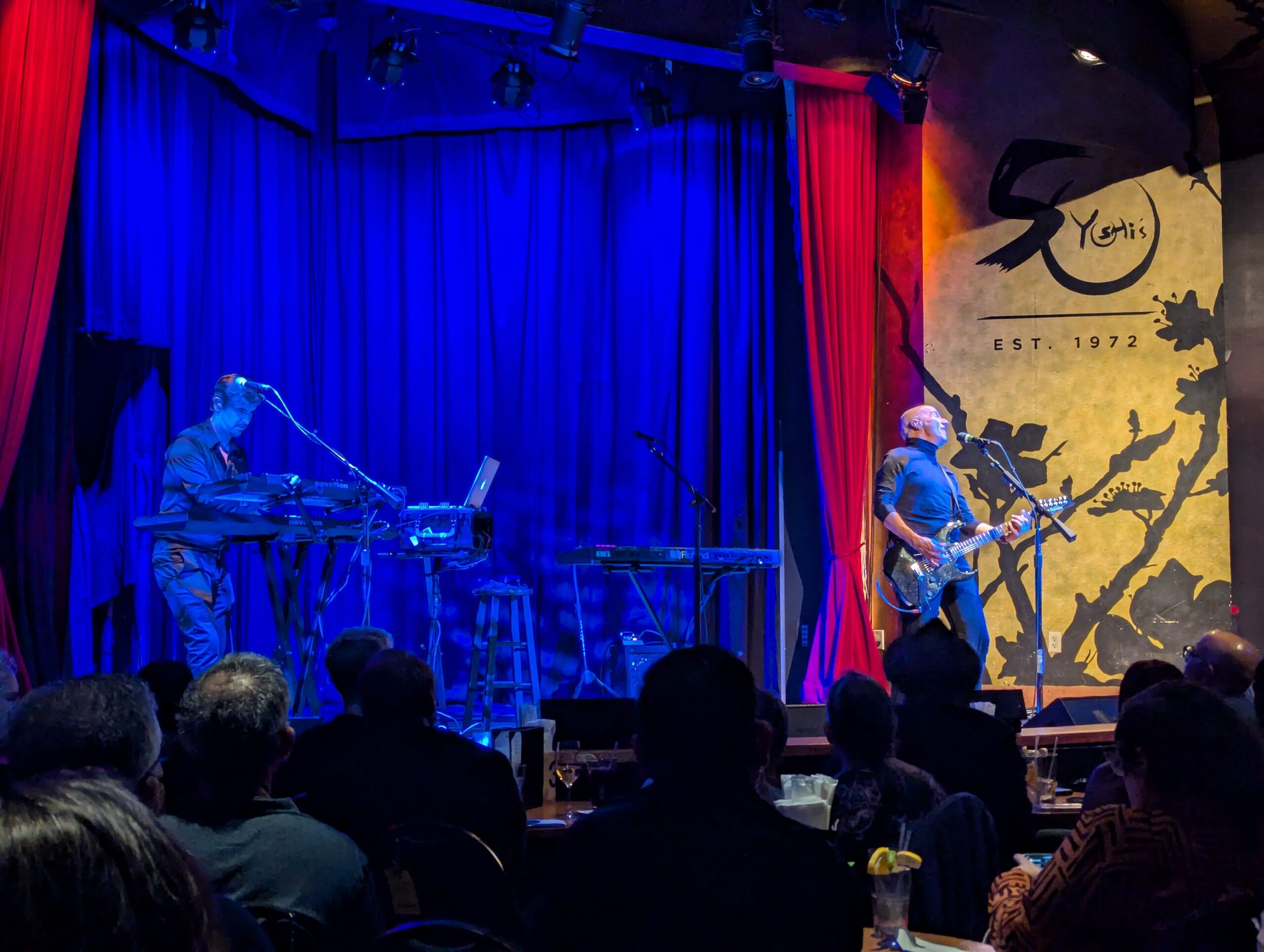
Some fans of Midge Ure, myself included, aren’t old enough to have seen Ultravox tour or any sets dedicated to his first handful of solo albums. What we were treated to was an evening where he celebrated his back catalogue and gave the fans an experience that some have been waiting for for a long time. In a career that spans six decades and hundreds of songs, you’re never going to please everyone in the audience, but if you were there then you know that everybody at Yoshi’s was treated to a show full of both timeless classics as well as loved hidden gems in a catalogue that’s full of both. I look forward to when Midge Ure comes back to this part of the country, and can’t wait to see what songs he decides to shine a light on next time he’s here.
The weekend before the show I was able to talk to Midge the morning of his show in Everett, Washington via Zoom. We talked about new music, touring the United States, his camaraderie with the other members of Ultravox, and the cancelled tour where he would have played guitar for Kate Bush. The full interview is below.
Tyler King: Thank you so much for taking the time out of your touring schedule to talk to me.
Midge Ure: Not a problem!
TK: How is the tour going so far?
MU: It’s going really well. There’s something about the fact that even though there are only two of us onstage the sound is very reminiscent of early Ultravox. So when we play some of the old Ultravox tunes you can see the joy in people’s faces because they’re about to hear those songs live, and the majority of people didn’t have that chance. Ultravox toured America something like three times before we decided to call it a day because soundchecks used to take five hours. The next logical step would be to open for a bigger band to get exposed to a wider audience, but we couldn’t do that with out five hour soundchecks. So to see the response from the crowds has been incredible, and the tour has gone down really well. I was a little reticent about doing it this way, this hybrid presentation where it’s neither one person with an acoustic guitar nor is it a full band, and I thought it might be perceived as just “karaoke,” but it’s not. It’s really going down well, and I’m very pleased.
TK: You mentioned the five hour soundchecks for Ultravox, but besides that what would you say are your pros and cons of this “band in a box” approach?
MU: So far there are no real cons. The pro is that I can actually go out there and perform in a way that is very similar to how Ultravox would have sounded or Visage would have sounded had Visage toured. And it enables me to play a lot of things that I normally wouldn’t or couldn’t play, so that’s a bonus.
TK: This tour looks like a very intense touring schedule. How do you prepare yourself for this kind of tour?
MU: You know what? I see musicians, especially as they get a little older, they go into a whole physical routine to prepare themselves for the rigors of touring. But… I’ve always done this. I didn’t really prep for it at all. The only thing I prepped for was doing the backing tracks for the computer onstage. So I did that prepping for months, but no physical prepping, just mentally and musically. It’s akin to blinking or breathing to me. I’ve toured live my entire life, long before I was out to make a record. My wife is petrified that I’m going to pop my clogs and never come back, but I don’t see it that way at all. A lot of musicians I know will avoid touring a specific territory if they didn’t have a certain level of success there. They won’t play the shows or if they do they won’t lift their own amplifiers… I do. I’m a working musician, and it’s no different than what I’ve done all my life.
TK: When you do a tour like this that focuses on your entire career, how do you go about choosing the setlist? You have a very rich solo career as well as Ultravox, Visage, Rich Kids, and so on. How do you prepare the setlist and how do you weigh songs that you feel passionate about playing versus songs that you feel you’re obligated to play?
MU: “Obligated,” that’s a very good perception! There are certainly songs that, if you didn’t play, people would come away from the show feeling miserable. But then you’ve got to factor in the fact that maybe 50% of the audience don’t know any of your stuff. They might know one or two songs, the singles that got played on the radio or whatever, but that’s it. So you’ve got to think about what will satisfy them, not necessarily the hardcore fans. The hardcore fans will usually be happy with whatever you play, even though there will always be that one fan that goes, “Why didn’t you play this one specific song?” And then on top of that, you have to pick songs that you yourself feel good about playing so you don’t just feel like a musical jukebox. “Press A7 to hear ‘Dear God,'” you know? So you have to try to balance it all. Plus on top of that, it’s a set, and a set has to have highs and lows. Especially in a situation like that I have where I’m sometimes playing five or six shows in a row in that many days, you have to give your voice a bit of a rest as well, so in the middle of the set I stick in an instrumental. And people did not expect to hear “Astradyne,” the opening track of the Vienna album. But I do it and it gives me six minutes to rest my voice in the middle of the set! So put all of that in a blender and press the “Go” button and what pops out is my set.

TK: After Ultravox broke up in the mid-80s, was there ever a period of time where you felt like you had to distance yourself from that material?
MU: Yeah, initially for years I wouldn’t even contemplate performing that music live. And it wasn’t because I didn’t like the songs, I just felt that that was then, that was its own period, leave it alone, get on with your solo stuff. So I did. And then over time I did start to slip in the odd Ultravox song into my live sets. And then when Ultravox got back together about a dozen years ago to play those tunes one more time, it was magnificent. It was fantastic. The moment we plugged in, even though we were using completely different equipment, it just sounded like Ultravox. And that power, that atmosphere, that thing, it was uncanny. It still existed. It was even more uncanny that we ended up writing and recording another album together after twenty-five years. So yes, I did distance myself from it, but then I realized that all of those songs were my babies. All of these things I created or helped to create were a part of me, so why wouldn’t I embrace them and bring them back into the fold and perform them again?
TK: Revisiting material like “Astradyne” or “Sleepwalk” or material from your first couple of solo albums, that material is in some cases over forty years old. Do you have a reverence for those songs that you didn’t at the time that they were new?
MU: It’s a double-edged sword. Some of the songs I find that I can’t do or I don’t feel comfortable singing them anymore. And it’s nothing to do with the vocal pitch or whatever, it’s to do with the content. A lot of the early stuff I didn’t write the lyrics of, a lot of the lyrics were written by Warren Cann, our drummer, and they seemed to make sense at the time. But as you say, forty years down the line you have a different perspective on it. Equally so, some of the other songs you look at and think, I’ve ignored this song for decades and I have no idea why. Case in point is “I Remember (Death In The Afternoon),” which I absolutely love playing! But despite the uncomfortability of some of the songs, I still played the entirety of the Vienna album last year when I played the Albert Hall. Ultravox never got a chance to play that venue, and I wanted to honor the legacy of the band and that time period and the other guys in the band, who were such a major part of my journey through my musical career.
TK: Did you ever look out in the audience and see the other members of the band out there?
MU: Sadly Chris, the bass player and my good friend, passed away a few months ago totally unexpectedly. He and I were such close friends, we worked on the music videos and album designs together, as well as lyrics. I was the youngest member of the band, and I’m old, so seeing the others is kind of difficult. Warren lives in Northern California and I’m hoping I can see him and catch up while I’m on this tour. Billy Currie is in London and he’s very sheltered and keeps to himself. I haven’t seen him since the last Ultravox show twelve years ago. My wife tells me to call my friends and catch up and I say, “Why?” But then when you do call them and talk to them all of that time slips away and it’s like you last spoke to them yesterday.
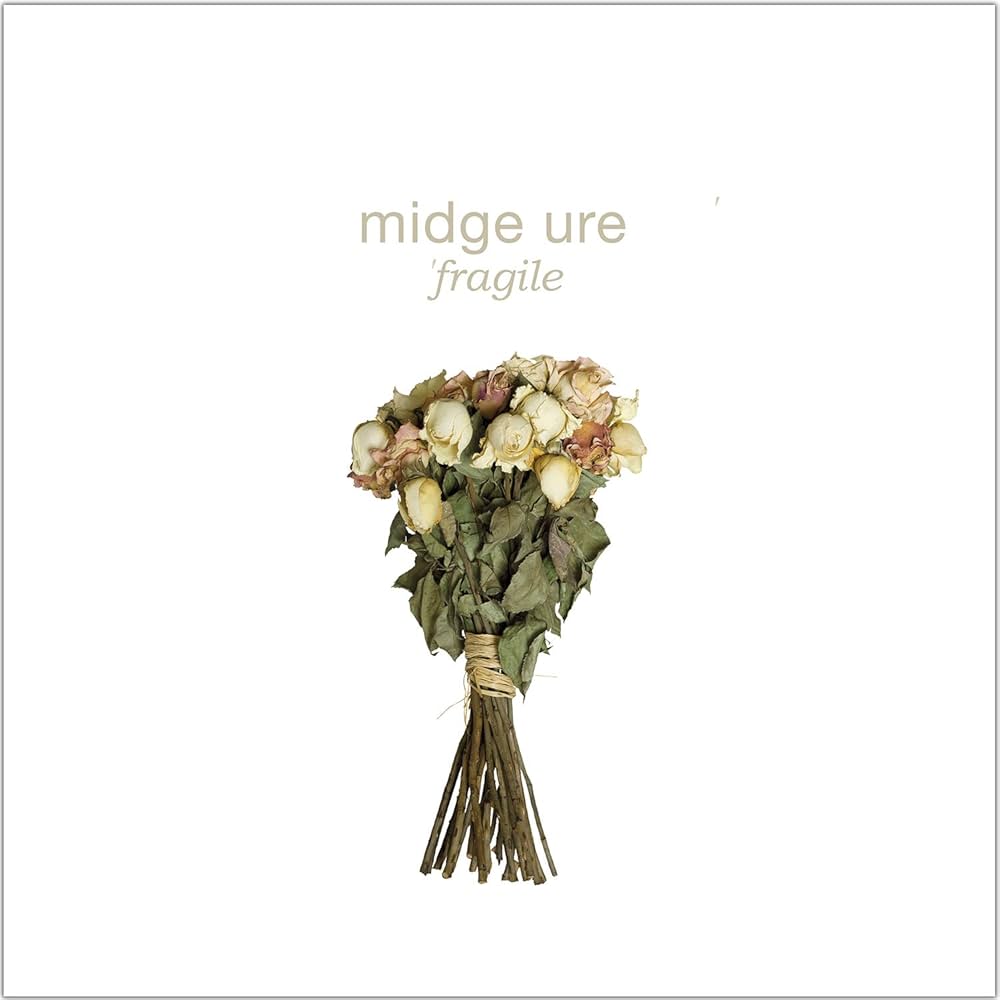
TK: Fast forward from Ultravox to your most recent solo album, Fragile, which came out in 2014. First of all I have to say that it’s one of my favorite albums that you’ve had any involvement in, including your work with Ultravox or the first Visage album. I read somewhere that it took you, on and off, ten years to make that record. It’s been ten years since Fragile was released, so can we be expecting your next album soon?
MU: First of all, thank you. Secondly, I won’t put a timeline on it, but yes, the record’s there. It’s about to go in the oven now that I’ve got all of the ingredients together. It isn’t me being pedantic or being lazy, it’s to do with standards. I’m not competing with somebody else, I’m not trying to make a better album than someone like Peter Gabriel or Sting or any other contemporary musician of mine, I’m trying to make a better album than the rest of mine. And I’m trying to find a more interesting way of saying things. And as I’ve gotten older, it’s become more difficult to satisfy myself. You cannot put something out that you’re not satisfied with and expect someone else to like it. It just doesn’t make sense to me. You have to get to a point where you can double underline it and say, “This is the best that I can do at this moment in time.” But I’m getting there, it’s very nearly done, and I’m aware it’s been ten years since my last album, which is ludicrous! That’s a longer stretch of time than most people’s careers.
TK: You have such an insane resume as far as being in different bands or working with different artists. Someone might only know you from your work with Visage or your solo material and then go to your Wikipedia page and be blown away by how deep the well of your work truly is. One of my favorite collaborations of yours was the song “After A Fashion” with Mick Karn. I’m wondering how that song came about, and did it have anything to do with the song “Cry” that you did with the other members of Japan besides David Sylvian?
MU: Mick and I met when we were doing a Prince’s Trust concert. Ultravox were being produced by Sir George Martin at the time, and I had just put out my first solo record while we were recording the Quartet album. I had just put out the single “No Regrets” and George, who was the musical director of the concert, told me that Pete Townshend was in charge of the band for the concert and wanted to know if I wanted to do the song “No Regrets.” I agreed, and then Pete asked if I could play lead guitar for the entire concert, and I said, “Lovely, fantastic.” And Mick Karn was the bass player. Pete always had his ear to the ground when it came to great musicians, and Mick and I just hit it off instantly. We were almost brothers, we became great friends, and the idea to do a song together just grew from there. I wanted to do something outside of the realms of Ultravox and Mick wanted to do something outside the realms of Japan, and “After A Fashion” was born from that.
“After A Fashion” came before “Cry,” which I think was an embryonic idea that I had. I wanted to work with the members of Japan, and I think that they were feeling a bit estranged from David Sylvian and wanted to do something else. So it was a kind of Visage-like project that we had ideas for and were talking about, but I didn’t want to be the singer. I just wanted to be a musician and be part of that with Mick and Richard Barbieri and Steve Jansen, and we did a couple of recordings. But we were trying to find a mythical singer, and we just never were able to get around to doing that, which is a real pity. But they were brilliant musicians and I saw them perform in Paris years ago and I saw Mick do some of his solo stuff and it was just great.
TK: Another one of my favorite collaborations that you’ve done, which I’m sure you’ve been told by more than a few people, is the song “Sister And Brother” with Kate Bush. I think it was Rolling Stone Magazine that recently did a list of the best Kate Bush collaborations and that song was included on that list. How did that come about and what was your relationship with her like at that point in time?
MU: Again, it was the same Prince’s Trust concert. Kate performed at it and she played her song “The Wedding List.” There was a great moment when we were all rehearsing in London and we were all listening to the songs we were going to be playing and everything was pretty straightforward. Then Kate comes in and says, “I’d like to do ‘The Wedding List'” and played it through the studio monitors and we all sat there, still not overly comfortable with each other because we had all just met, nodding our heads, and as Kate left the studio everyone was thinking it but nobody wanted to say it, and then finally Pete said, “Well that’s a piece of piss then, isn’t it,” being ironic about it being easy because the song was so complicated!
So I met Kate there and got on incredibly well with her. She’s just lovely, everyone loves Kate. The two of us were invited to an event put on by Prince Charles and Princess Diana, at the time Lady Diana, at Kensington Palace as a way of saying thank you to us. And it was at that party that I said to her, “I’ve got this song that I think should be a duet. Would you like to maybe possibly do it?” She told me to send her the multitracks, so I sent the tapes over to her studio. She was in the middle of working on her own record so I thought I wouldn’t hear anything back for months. Two or three days later she called me up and asked if I wanted to come over and hear what she’d done. I thought she would just have stuck a vocal on it and called it a day, but I went into her studio and she played this thing and she had “Kate Bush’d” it. She had done this choir, this multitracked vocal thing, and I stood there with a lump in my throat and tears in my eyes, it was just spectacular. The one downside was that I never got to see her sing it.
Right after her guitar player Alan Murphy died, she contemplated going out on tour and she called me up to ask me if I would play guitar on it. We were in rehearsals for two or three days with a full band and we ran through these songs and then she got cold feet about doing it. She wanted to go out and play live but then she started thinking about the staging. And I’m saying to her, “You don’t need any staging. You don’t need dancing cellos and you don’t need magicians. You don’t need that. People will just die to see you singing these songs.” But unfortunately she didn’t do it, so…
TK: What could have been!
MU: Absolutely! But you know, we’ve always got “Sister And Brother!”


